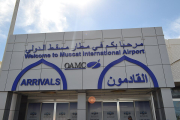UK News
-
 UK arrests three men over alleged China espionage links, reports say one is partner of MP
British counter-terrorism police have arrested three men on suspicion of assisting China’s foreign intelligence services, escalating tensions between London and BeijingRead More...
UK arrests three men over alleged China espionage links, reports say one is partner of MP
British counter-terrorism police have arrested three men on suspicion of assisting China’s foreign intelligence services, escalating tensions between London and BeijingRead More... -
 UK imposes emergency visa curbs on students and Afghan workers as asylum claims surge
Britain will block study visas for nationals of four countries and suspend work visas for Afghans in a sweeping move the government says is needed to stem a sharp rise in asylum claims madeRead More...
UK imposes emergency visa curbs on students and Afghan workers as asylum claims surge
Britain will block study visas for nationals of four countries and suspend work visas for Afghans in a sweeping move the government says is needed to stem a sharp rise in asylum claims madeRead More... -
 UK pumps £30m into satellite communications push to win bigger slice of £40bn global market
The UK government is stepping up its bid to become a major force in satellite communications, unveiling £30 million in fresh funding for British space firms targeting aRead More...
UK pumps £30m into satellite communications push to win bigger slice of £40bn global market
The UK government is stepping up its bid to become a major force in satellite communications, unveiling £30 million in fresh funding for British space firms targeting aRead More... -
 UK expands flights from Oman to evacuate vulnerable Britons as Gulf tensions rise
The UK government is working with commercial airlines to increase the number of flights leaving Oman, as it moves to prioritise the evacuation of vulnerable British nationals from the region.Read More...
UK expands flights from Oman to evacuate vulnerable Britons as Gulf tensions rise
The UK government is working with commercial airlines to increase the number of flights leaving Oman, as it moves to prioritise the evacuation of vulnerable British nationals from the region.Read More... -
 Royal Docks unveils UK’s first Circular Construction Hub, powering London’s path to Net Zero by 2030
London has taken a major step towards a greener future with the launch of the UK’s first Circular Construction Hub in the Royal Docks — a flagship project that aims toRead More...
Royal Docks unveils UK’s first Circular Construction Hub, powering London’s path to Net Zero by 2030
London has taken a major step towards a greener future with the launch of the UK’s first Circular Construction Hub in the Royal Docks — a flagship project that aims toRead More...

Culture
-
 UK music exports get £1.4m boost as 68 independent artists win global growth grants
Rising British music talent is set for a global push after 68 independent UK acts secured a combined £1.4 million in government-backed funding designed to grow international audiences, boostRead More...
UK music exports get £1.4m boost as 68 independent artists win global growth grants
Rising British music talent is set for a global push after 68 independent UK acts secured a combined £1.4 million in government-backed funding designed to grow international audiences, boostRead More... -
 Emery Walker revealed: new exhibition explores the man behind the arts and crafts legend
A new exhibition opening this spring at Emery Walker’s House sets out to restore depth, warmth, and personality to one of Britain’s most influential yetRead More...
Emery Walker revealed: new exhibition explores the man behind the arts and crafts legend
A new exhibition opening this spring at Emery Walker’s House sets out to restore depth, warmth, and personality to one of Britain’s most influential yetRead More... -
 London confirms St Patrick’s Day 2026 parade and Trafalgar Square festival
London will turn green once again next spring after the Mayor confirmed the capital’s St Patrick’s Day celebrations will take place on Sunday 15 March 2026, with aRead More...
London confirms St Patrick’s Day 2026 parade and Trafalgar Square festival
London will turn green once again next spring after the Mayor confirmed the capital’s St Patrick’s Day celebrations will take place on Sunday 15 March 2026, with aRead More... -
 Masterpieces beyond the Museum: National Gallery brings life-size art to communities ccross the UK
World-famous paintings from the National Gallery are stepping out of Trafalgar Square and into everyday life, as part of a major touring project that will seeRead More...
Masterpieces beyond the Museum: National Gallery brings life-size art to communities ccross the UK
World-famous paintings from the National Gallery are stepping out of Trafalgar Square and into everyday life, as part of a major touring project that will seeRead More... -
 Award-winning Polish writer Mariusz Szczygieł brings ‘Not There’ essay collection on UK tour
Polish writer Mariusz Szczygieł, one of Central Europe’s most acclaimed literary reporters, will tour the UK later this month with a series of public events marking the English-language release...Read More...
Award-winning Polish writer Mariusz Szczygieł brings ‘Not There’ essay collection on UK tour
Polish writer Mariusz Szczygieł, one of Central Europe’s most acclaimed literary reporters, will tour the UK later this month with a series of public events marking the English-language release...Read More... -
 Professor Dame Carol Black GBE reappointed as Chair of the British Library for 2026–2027
The UK Secretary of State has confirmed the extension of Professor Dame Carol Black GBE as Chair of the British Library, continuing her leadership from 1 September 2026 to 31 August 2027.Read More...
Professor Dame Carol Black GBE reappointed as Chair of the British Library for 2026–2027
The UK Secretary of State has confirmed the extension of Professor Dame Carol Black GBE as Chair of the British Library, continuing her leadership from 1 September 2026 to 31 August 2027.Read More... -
 Climate, community and care: Soma Surovi Jannat’s landmark exhibition at the Ashmolean Museum
From spring through autumn 2026, the Ashmolean Museum presents 'Soma Surovi Jannat: Climate Culture Care', a powerful new exhibition that places climateRead More...
Climate, community and care: Soma Surovi Jannat’s landmark exhibition at the Ashmolean Museum
From spring through autumn 2026, the Ashmolean Museum presents 'Soma Surovi Jannat: Climate Culture Care', a powerful new exhibition that places climateRead More... -
 Londoners on trial: 700 years of crime revealed in a free City archives exhibition
From medieval pickpockets to notorious Victorian figures, seven centuries of crime, punishment and public fascination are laid bare in a new exhibition atRead More...
Londoners on trial: 700 years of crime revealed in a free City archives exhibition
From medieval pickpockets to notorious Victorian figures, seven centuries of crime, punishment and public fascination are laid bare in a new exhibition atRead More... -
 Lost for centuries, Henry VIII’s golden love pendant finds a home at the British Museum
A golden heart pendant once symbolizing the doomed marriage of Henry VIII and Katherine of Aragon has finally been secured for permanent display at the BritishRead More...
Lost for centuries, Henry VIII’s golden love pendant finds a home at the British Museum
A golden heart pendant once symbolizing the doomed marriage of Henry VIII and Katherine of Aragon has finally been secured for permanent display at the BritishRead More... -
 British High Commission hosts Caledonian Ball in Lahore to celebrate growing Scotland–Pakistan partnership
The British High Commission brought a touch of Scotland to Lahore this week as it hosted the Caledonian Ball at the historic Sir Ganga Ram Residence, celebratingRead More...
British High Commission hosts Caledonian Ball in Lahore to celebrate growing Scotland–Pakistan partnership
The British High Commission brought a touch of Scotland to Lahore this week as it hosted the Caledonian Ball at the historic Sir Ganga Ram Residence, celebratingRead More... -
 300-year-old Rysbrack Marble putti blocked from export as UK scrambles to save national treasure
A three-century-old marble sculpture by renowned eighteenth-century sculptor Michael Rysbrack has been placed under a temporary UK export ban, giving BritishRead More...
300-year-old Rysbrack Marble putti blocked from export as UK scrambles to save national treasure
A three-century-old marble sculpture by renowned eighteenth-century sculptor Michael Rysbrack has been placed under a temporary UK export ban, giving BritishRead More... -
 Inside ICG PR: how an international PR agency shapes reputation for luxury, fashion, and cultural brands
Interview: the co-founder of Iris Consulting Group Iryna Kotlyarevska on building global visibility with cultural intelligenceRead More...
Inside ICG PR: how an international PR agency shapes reputation for luxury, fashion, and cultural brands
Interview: the co-founder of Iris Consulting Group Iryna Kotlyarevska on building global visibility with cultural intelligenceRead More...

British Queen celebrates
Most Read
- Teen held after US woman killed in London stabbings
- Heave-ho Harry! Prince prepares to join the walking wounded in ice trek to North Pole
- Football: Farhad Moshiri adamant Everton deal above board
- "Master of English Style". Interview with Designer Lydia Dart
- Letter to the Financial Times from Lord Mayor Alderman Michael Bear
World News

British Prime Minister Boris Johnson is seeking to retain power in the December 12 election that has been dominated by Brexit — a hugely divisive plan for which Trump has voiced strong

President Donald Trump on Thursday criticised British Prime Minister Boris Johnson's Brexit divorce deal, saying it made it impossible to strike a future commercial agreement with

The "Holy Grail" of whiskies smashed the record for the most expensive bottle ever sold, going for nearly £1.5 million (S$2.62 million) at a London auction.

A team of British experts arrived in Iran on Monday to begin work to upgrade the Arak heavy water nuclear reactor, the UK embassy in Tehran said.

The Hong Kong Stock Exchange on Tuesday dropped its multibillion-dollar takeover bid for the prized London Stock Exchange Group, which would have created a global

Britain's Prime Minister Boris Johnson urged the United States on Monday to reconsider granting immunity to a diplomat's wife suspected of killing a teenager in a British road

British Prime Minister Boris Johnson warned the European Union on Sunday he will not delay Brexit beyond October 31, underlining that his latest proposals are a last chance

The global mining industry is increasingly showing a commitment towards greater respect for human rights and the environment, but is accused of wanting to improve its

Britain must pay its Brexit divorce bill even if it crashes out of the bloc without a deal, the EU said Monday, warning that future ties would be threatened if London failed to honour its

Ryanair flew an almost full service on Thursday, the Irish no-frills airline said despite strikes by pilots and cabin crew based in Britain and Portugal triggered by pay disputes.




















